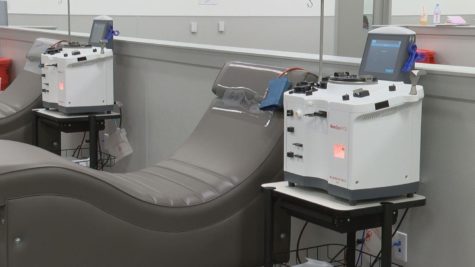New medical marijuana capsule could provide relief
Courtesy of Blausen Medical via Wikimedia Commons
marijuana pills.png
February 24, 2016
An organic suppository released at the end of January could provide relief for people who suffer from menstrual cramps or endometriosis, thanks to an unusual ingredient — marijuana.
Foria Relief, a medicinal marijuana vaginal suppository that costs $44 for four “servings,” is inserted like a tampon. Each cocoa butter-based capsule is composed of a combination of tetrahydrocannabinol (THC), the chemical in cannabis that produces a psychological high, and cannabidiol (CBD), a component of cannabis that has been used as a muscle relaxant.
Foria states on its website that this combination works by activating receptors in the pelvic region, which activate when chemicals found in marijuana, such as THC or CBD, enter the body. Between affecting nerve endings in the uterus, cervix and ovaries and reducing electrical signals to surrounding muscles, users may experience a drop in the cramping, pain and inflammation related to their periods.
Within 15-30 minutes of inserting the capsule, the company claims that the person’s pain should go away. The product is able to relax the person experiencing cramping or pain without them actually getting high.The effects last a few hours after being inserted, according to user reviews.
Users are able to insert tampons at the same time as Foria Relief, but should not use painkillers such as Midol unless they first consult a doctor.
So far, Foria, the company that produces Foria Relief, has only released the product in California. Users from that state can buy it in dispensaries or order online with proof of a doctor’s medical marijuana recommendation.
The company tests its products at several labs in the western United States, where recreational or medical marijuana is legal, but is unable to get FDA approval.
Foria is also unable to clinically test its products. Clinical testing is different from normal research testing Foria does, mainly because clinical tests must be approved by the government. The U.S. government classifies marijuana as a Schedule I drug, which means it does not believe marijuana has a medical use.
Instead, Foria relies on user reviews posted on its website to promote Foria Relief’s effects. Because of the company’s inability to obtain FDA approval, it cannot market Foria Relief specifically as a treatment or cure.
However, medicinal marijuana’s use as a muscle relaxant and painkiller — as it is used in this product — has been previously researched.
Cannabinoids — chemical compounds like THC and CBD — can be effective in treating chronic pain, neuropathic pain and spasticity, or muscle stiffness, in patients with multiple sclerosis, according to a 2015 literature review published in the Journal of the American Medical Association.
Medical marijuana’s use as a painkiller has been perhaps best documented in cancer patients, who in some states can receive prescriptions to address nausea or pain that come about as a result of chemotherapy. Two cannabinoid-based medications, dronabinol and nabilone, are currently FDA-approved to address only nausea. They are also the only FDA-approved medications containing marijuana-based chemicals.
A literature review published in 2008 in the Journal of Cannabis Therapeutics concluded that cannabinoids may be able to treat conditions affecting healthy menstruation in addition to symptoms of menopause.
Scientists are performing clinical trials with marijuana to test its effectiveness to treat diseases and conditions including autoimmune diseases, inflammation and pain, seizures, substance abuse and mental illness, according to the National Institute on Drug Abuse.

















